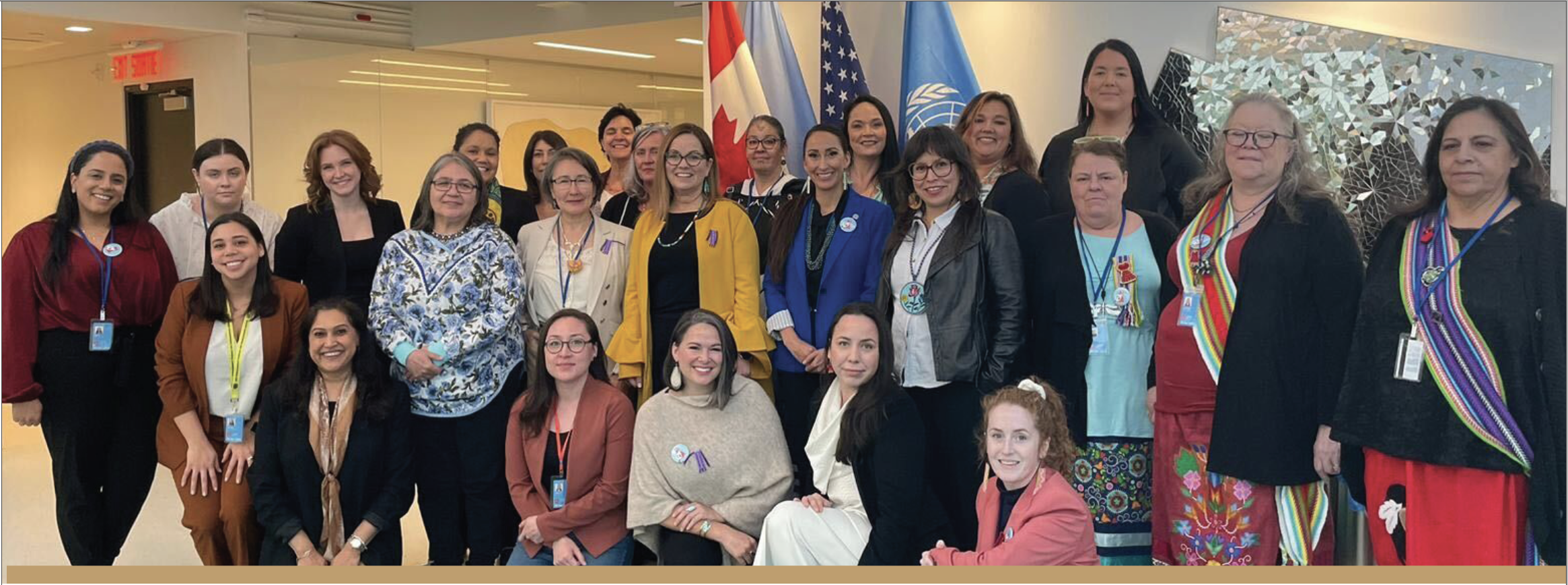The Trilateral Working Group on Violence Against Indigenous Women and Girls

On April 19, 2022, the Permanent Mission of Canada to the United Nations in New York City hosted a planning meeting for the Trilateral Working Group on Violence Against Indigenous Women and Girls (Trilateral WG). Selected participants were:
- Nicole Matthews, Minnesota Indian Women’s Sexual Assault Coalition
- Dawn Stover, Alliance of Tribal Coalitions to End Violence
- Whitney Gravelle, Bay Mills Indian Community,
- Dr. Diane Gout, Gray O.A.K., LLC
- Mary Kathryn Nagle, National Indigenous Women’s Resource Center
- Justice Anne McKeig, Minnesota State Supreme Court
- Angel Charley, Coalition to Stop Violence Against Native Women
- Erica Pinto, Jamul Indian Village
- Shanna Parker, Angels Go To Work
- Christina Love, Alaska Network on Domestic Violence and Sexual Assault
- Caroline LaPorte, STTARS Indigenous Safe Housing Center, and Little River Band of Ottawa Indians.
The planning meeting is expected to inform the program for the Trilateral WG, which will be held in Canada in September of 2023.
The group last met in July 2022, hosted by the Biden Administration’s White House. The Trilateral WG, which is a convening between the United States, Mexico, and Canada, was initially created as an outcome of the North American Leaders’ Summit (2016) to affirm each country’s commitment to addressing gender-based violence impacting Indigenous women, girls, Two-Spirit and gender-diverse individuals.
The last convening focused on three main areas:
- Strengthening access to justice.
- Addressing the root causes of gender-based violence.
- Advancing Indigenous women’s leadership.1
For this initial meeting of 2023, selected participants were asked to think about four specific event concepts and themes:
- Human trafficking (including root causes and early intervention/prevention).
- Leadership development of Indigenous women, young women, girls, Two-Spirit, and gender-diverse peoples.
- Data collection (data tracking and developing a tool/mechanism for MMIWG and human trafficking of Indigenous women and girls).
- Access to justice (including culturally respective practices).
President Whitney Gravelle provided a traditional opening for the planning meeting, and the group began a private dialogue without the presence of government officials.
Many of the conversations were thematic, meaning that the Indigenous Women leaders from each country spoke on overwhelmingly and concerningly similar issues. This bolsters the need for the Trilateral WG and the cross-collaboration between all three countries. Some of the issues that arose during the private discussion as well as the discussion with government officials were:
- The hyper-sexualization of children.
- The risk of digital violence.
- The frustration of being unable to access cultural resources/utilize cultural responses.
- The systemic violence.
- The racial injustice.
- The femicide.
- The urgent need for data.
- The absence of emergency shelters.
- The concern around reproductive health/access to justice.
- The ongoing forced and coerced sterilization.
- The inability of gender-diverse individuals to receive help.
- The concerns about the United States Supreme Court.
- The rate of incarceration experienced by Indigenous women.
- The lack of language access.
- The over-generalization of data.
- The economic issues that put Indigenous peoples at risk for trafficking.
- The pay inequity.
- The homelessness.
- The high rates of out-of-home placements for Native youth.
The meeting ended with the United States, Canada, and Mexico ensuring participants that there would be an opportunity to convene again before September so that all comments that would assist with planning can be best utilized. Participants from Canada requested that the governments provide some concrete steps for institutionalizing the information shared at previous meetings and to ensure that future meetings can build upon that knowledge. There was a request to form the Working Group into a living, breathing collective that would continue to work beyond the official convening.
We want to thank the United States government representatives who hosted the individuals listed above and who tirelessly coordinated this planning meeting:
- Rosie Hidalgo, White House Gender Policy Council
- Miranda Baxter, White House Gender Policy Council.
- Catie Kenyon, US Mission to the United Nations.
- Dr. Nancy Levine, National Institute of Justice.Heidi Todacheene, Department of the Interior.
- Sherriann Moore, Department of Justice.
- Cailin Crockett, White House Gender Policy Council.
- Elizabeth Reese, White House Domestic Policy Council.
- Leora Falk, Department of State.
- Miranda Carman, Department of Health and Human Services.
- Liz Carr, White House Office of Management and Budget.
- Lynn Rosenthal, Department of Health and Human Services.
We greatly appreciated the space you all created for us to come together in our shared work. We look forward to September and to supporting these efforts in the many months to come.
1 bit.ly/3VY7iG9
This resource is made possible by grant #90EV0537, from the Administration on Children, Youth and Families, Family and Youth Services Bureau, U.S. Department of Health and Human Services. Its contents are solely the responsibility of the author(s) and do not necessarily reflect the official views of the U.S. Department of Health and Human Services.





